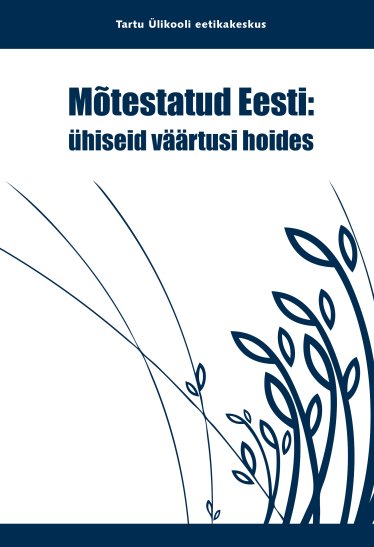Contemplating Estonia - Upholding Common Values

Editors Margit Sutrop, Triin Pisuke
Language Editor Külli Kuusk
Design Merle Moorlat
Published with the support of the Estonian Ministry of Education and Research
Estonian Language Foundation 2008
Language: Estonian
Contemplating Estonia – Upholding Common Values (est Mõtestatud Eesti - ühiseid väärtusi hoides) is a book published by the Centre for Ethics in February 2009. This book is dedicated to the 90th anniversary of the independent Republic of Estonia, which was celebrated in 2008. The book was published in the course of the National Programme “Value Development in Estonian Society 2009-2013”.
The book includes presentations from two conferences. The first, “Contemplating Estonia: Values and Choices”, was held on 6 February 2007, and its purpose was to map the values of Estonians and to discuss questions of nationalism, integration, identity and value development. The second conference, “Upholding Common Values”, was held on 26 September 2008, and it continued and developed the discussion of the previous conference, concentrating on national values and values in education. During the conference, the Estonian Minister of Education Mr Tõnis Lukas announced the discussion of the National Programme “Value Development in Estonian Society 2009-2013”.
The authors of the book try to answer to the following questions:
What are the values of Estonians? Where is Estonia on the world map of values? What do we understand by the idea of Europe as a union of values? What are the constitutional values of Estonia? What do we understand by democracy? What do Estonians understand by state and nationalism? What is the role of schools and media in communicating and propagating values? What can Estonia learn from the experience of other countries in value development?
The book is divided into four parts. The first part is dedicated to the values of the Republic of Estonia. In this part, the constitutional values of Estonia are discussed and the idea of democracy is examined. The authors of this part are Pärtel Piirimäe (Associate Professor of History at the University of Tartu), Jüri Adams (a politician and Member of the Estonian Constitutional Assembly during 1991–1992), Marju Lauristin (Professor of Social Communication at the University of Tartu), Dr. Iivi Anna Masso (a political scientist at the University of Helsinki and journalist) and Enn Soosaar (translator and journalist).
The second part of the book discusses questions of nationalism and patriotism. The mutual relations of man, state, society and treaty are examined. Also, the issue of the ‘bronze soldier’ is discussed. The authors of this section are Jaak Aaviksoo (a politician, currently Estonian Defence Minister, a Member of the Estonian Academy of Sciences, and Professor of Optics and Spectroscopy), Dr. Eva Piirimäe (Senior Researcher in Political Philosophy at the University of Tartu), Raivo Vetik (Professor in Comparative Politics at the University of Tallinn) and Merle Karusoo (set designer at the Estonian Drama Theatre).
The third part of the book is about the value systems of Estonia and Europe. The peculiarities of the Estonian image of values are analysed. This part includes a sociological survey of the lifestyles and values of Estonians. Andres Põder writes about Christian values in Estonian society and Rein Taagepera’s essay places Estonia on the world map of values. The authors of this part are Mati Heidmets (Professor of Psychology at the University of Tallinn), Airi-Alina Allaste (Professor of Sociology at the University of Tallinn), Rein Taagepera (Research Professor of Political Science at the University of California), Jaan Männik (Chairman of the Supervisory Board of the Bank of Estonia), and Andres Põder (Archbishop of the Evangelical Lutheran Church of Estonia).
The fourth part of the book is dedicated to values in education. The influence of media on the development of young people’s values is discussed. Finnish and American experiences in value education are introduced. The authors of this part are Erkki Hulkki (a journalist on social affairs in Finland), Halliki Harro-Loit (Senior Lecturer of Journalism at the University of Tartu), Jaana Vasama (the Head of the Finnish Institute in Estonia) and Merle Schwartz (Director of Education and Training at Character Education Partnership in the United States).


